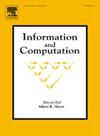Efficient assignment of identities in anonymous populations
IF 0.8
4区 计算机科学
Q3 COMPUTER SCIENCE, THEORY & METHODS
引用次数: 0
Abstract
We consider the fundamental problem of assigning distinct labels to agents in the probabilistic model of population protocols. Our protocols operate under the assumption that the size n of the population is embedded in the transition function. W.h.p. (with high probability), they are silent, i.e., eventually each agent reaches its final state and remains in it forever, and they are safe, i.e., never change a label that has already been assigned to an agent. We provide efficient protocols for this problem complemented with tight lower bounds. Our fast labeling protocol uses only interactions w.h.p., states, and the label range , where and , while our nearly state-optimal protocol uses only states, the label range , and w.h.p., interactions.
匿名群体中有效的身份分配
在种群协议的概率模型中,我们考虑给agent分配不同标签的基本问题。我们的协议是在假定人口的大小n嵌入到过渡函数的情况下运行的。W.h.p(高概率),它们是沉默的,也就是说,最终每个agent到达最终状态并永远保持在该状态,它们是安全的,也就是说,永远不会改变已经分配给agent的标签。我们为这个问题提供了有效的协议,并补充了严格的下界。我们的快速标记协议只使用O(nlog (n)/ε)个相互作用w.h.p., (2+ε)n+O(na)个状态和标签范围[1,(1+ε)n],其中1≥ε>;0和0<;a<1,而我们的接近状态最优协议只使用n+5n+O(log (log))个状态,标签范围[1,n]和w.h.p., O(n3)个相互作用。
本文章由计算机程序翻译,如有差异,请以英文原文为准。
求助全文
约1分钟内获得全文
求助全文
来源期刊

Information and Computation
工程技术-计算机:理论方法
CiteScore
2.30
自引率
0.00%
发文量
119
审稿时长
140 days
期刊介绍:
Information and Computation welcomes original papers in all areas of theoretical computer science and computational applications of information theory. Survey articles of exceptional quality will also be considered. Particularly welcome are papers contributing new results in active theoretical areas such as
-Biological computation and computational biology-
Computational complexity-
Computer theorem-proving-
Concurrency and distributed process theory-
Cryptographic theory-
Data base theory-
Decision problems in logic-
Design and analysis of algorithms-
Discrete optimization and mathematical programming-
Inductive inference and learning theory-
Logic & constraint programming-
Program verification & model checking-
Probabilistic & Quantum computation-
Semantics of programming languages-
Symbolic computation, lambda calculus, and rewriting systems-
Types and typechecking
 求助内容:
求助内容: 应助结果提醒方式:
应助结果提醒方式:


